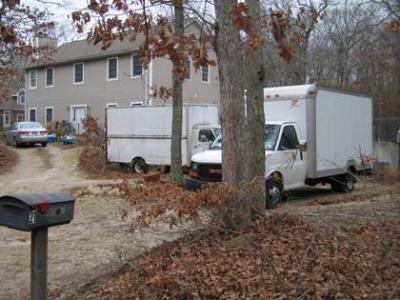A New Pass at Truck Parking Law

A new draft law to limit overnight parking of commercial vehicles and work trucks on residential lots was laid on the table at East Hampton Town Hall on Tuesday, after a previous attempt at legislation had been sent back to the drawing board.
At a hearing on the previous draft, which would have imposed a ban on certain types of vehicles at residences, contractors showed up at Town Hall en masse to tell the board how new rules could negatively impact their ability to make a living from their small, sole-proprietor businesses. Though business is conducted at their clients’ locations, they told officials, they use their work trucks to go to and from their residences. Having to obtain a commercially zoned property to park their trucks would be a significant burden, they said.
Pickup trucks with commercial or standard registration — and which do not have business signs or logos on them — would not be regulated.
The updated proposal, developed by Town Supervisor Larry Cantwell and Councilman Fred Overton after consulting with a committee of contractors and residents concerned about the commercialization of their neighborhoods, would place new limits on the size and number of trucks that could be parked on residential properties while providing an exception for those property owners who already have trucks that would fall outside the size limit.
It seeks to provide a “stricter standard going forward, and at the same time recognize some of the pre-existing conditions . . . to provide some recognition for those who have been doing it who own their own properties and are licensed contractors,” Mr. Cantwell said Tuesday.
The new standards would allow one commercially registered car or light truck (with a gross vehicle weight of 12,000 pounds or less) to be parked overnight at a residence, but only if the vehicle is owned by a licensed home improvement contractor (or their employee) who resides in the house. At least 75 percent of the vehicle would have to be invisible to neighbors or from the roadway, by parking it behind a fence, shrubbery, or other screening.
Standard pickup trucks with commercial or standard registration — and which do not have business signs or logos on them — would not be regulated.
An existing limit on rental properties, which says a maximum of four vehicles may be parked there overnight, would be maintained.
The new standard would be lifted for contractors that, as of a date to be set by the town board, are licensed, own and live on their property, and already own a registered vehicle that exceeds the size limit. Nonetheless, no vehicles over 14,000 pounds would be allowed.
To claim the exception, contractors would have to register with the town clerk within six months of the new law’s enactment. The vehicles would have to be screened in their parking spots, as dictated by the new proposed rule. They could be replaced in kind, as needed, but if contractors sold the property, they could not claim the exception at a new location. The exception would not apply to a business’s employees.
On properties of less than one acre, one vehicle that exceeds the new standards would be allowed. If a site is over an acre, two would be allowed.
The draft law also addresses utility trailers. It would allow one, whether open or enclosed, of 18 feet long or less, on properties of an acre of less, or two on lots of over an acre. They would also have to be largely screened from sight. On an acre or more, larger trailers would be allowed and would be counted as a commercial vehicle.
“I think this is a really good compromise,” Councilman Peter Van Scoyoc said on Tuesday. “I think it addresses the problem in very specific ways.” He recognized that it “won’t please everyone,” but said that the proposed law “addresses the visual aspects of these impacts on neighbors and neighborhoods” and includes “a sort of sunset, if you will, or amortization,” of the situations where contractors keep the larger trucks at home.
He suggested, however, allowing up to two standard or small pickups with business signs on them at a house, in case a couple each has one they use for work.
Other board members agreed that the draft law should be the subject of a hearing. Councilwoman Sylvia Overby suggested that, in addition to screening vehicles from sight, a setback from adjacent property lines for parking areas might be required. She said the board might also try to address situations where a local business gets passed down to a “direct heir,” and allow the parking of a nonconforming truck to continue.
Councilwoman Kathee Burke-Gonzalez said that education would be needed about new restrictions, and that the board should ensure that the law addresses those in professions where trucks are used, but where town home improvement contractor licenses are not required.
A hearing date has not been scheduled.
